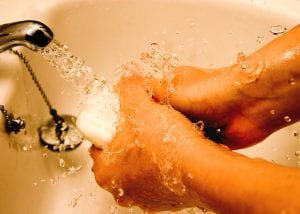
Despite controversy over the use of antibacterial soap, washing our hands remains the best form of protection against bacteria, viruses, and other potentially dangerous microbes (Source: Flickr).
Since early 2013, there has been controversy regarding the use of antibacterial soap for everyday hand washing. According to guidelines set by the World Health Organization, it is recommended that thorough washing with antibacterial soap for at least 20 seconds in warm water is used to remove potential contaminants (1). Since then, there has been a large boom in the number of commercial soaps sold on the market which advertise the use of triclosan, the most common antibacterial chemical used in hand soaps.
However, in December of 2013, the FDA proposed a new rule in which all manufacturers must prove that antibacterial soap was in fact more effective at reducing contamination than plain soap in order to continue marketing their products. In light of these claims, a Korean study conducted by S. A. Kim, et. al. reveals the relative effects of both antibacterial and plain soap in reducing the amounts of 20 different types of bacteria, both Gram-positive and Gram-negative (1).
According to the in vitro study, which emulated the conditions of hand washing by introducing 100 uL of various types of bacteria into test tubes containing heated soap solutions, the reduction in bacterial contamination are no more significant (P > 0.05) for antibacterial soap than they are for plain soap at triclosan concentrations of < 0.03%, the federally mandated limit (1). To control all other extraneous factors, the researchers kept all ingredients and chemicals between the two soap solutions the same with the exception of triclosan. In fact, the difference in the bacterial populations for all 20 strains between the two experimental group remained less than one log cfu/mL.
While these results may seem astonishing, the researchers did admit that a antibacterial soap was more effective at reducing bacterial populations after incubation for a period of at least nine hours. In this manner, bacterial populations in antibacterial soap survived only up to 24 hours while bacterial under plain soap condition survived for up to 72 hours (1). In addition, the researchers also reveal that the presence of other chemical and compounds within the soap, such as surfactants, may inhibit the effectiveness of the soap’s antibacterial properties (1).
To further test these results in vivo, the researchers also inoculated bacteria under the strain of S. marcescens onto the human hands of 16 adult volunteers, who all performed at controlled hand-washing procedure under similar conditions (1). Suprisingly, the results of the in vivo study appear to corroborate the previous findings of the in vitro study. While triclosan seemed to have a bigger role in decreasing bacterial populations at concentrations higher than 0.03%, the difference between its effectiveness with plain soap was at best minimal under current federally mandated restrictions (1).
Regardless of the findings in this study, washing our hands remains the best method in protecting our health and wellness on a global scale. Despite growing concerns regarding the rise of antibiotic resistance with respect to the everyday use of triclosan, we can remain safe by using either antibacterial or plain soap. Whether through the use of alcohol-based hand sanitizers or hand soaps, maintaining hygiene is an essential part of staying healthy and preventing the spread of deadly microbes between fellow members of our species.
References:
1. Kim, S. A., Moon, H., Lee, K., & Rhee, M. S. (2015). Bactericidal effects of triclosan in soap both in vitro and in vivo. Journal of Antimicrobial Chemotherapy, dkv275.